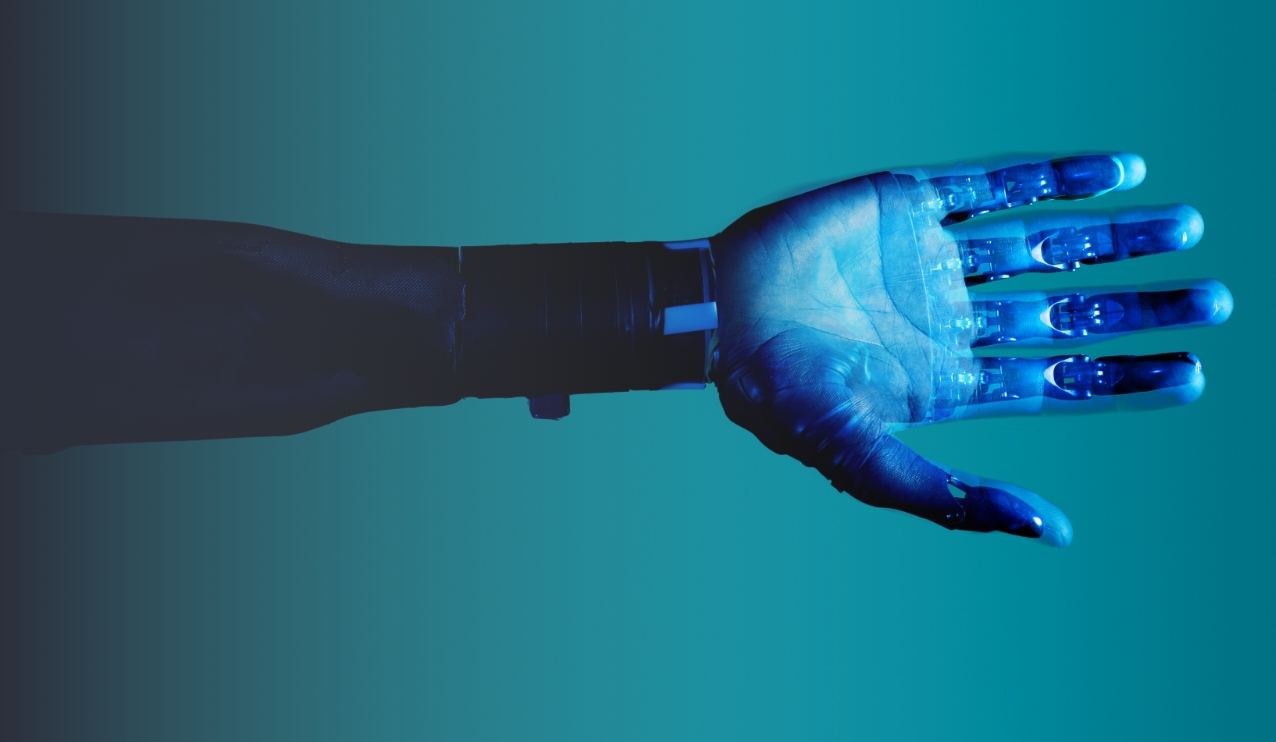With the rapid spread of the use of artificial intelligence (AI) in pioneering large corporations as well as the latest startups, small and medium-sized enterprises (SMEs) are getting closer to deciding whether and how to more fully integrate AI technologies into their businesses. As with the start of any new development, most SMEs are inhibited by the uncertainties and challenges associated with AI. This blog article provides clarity on the current developments, opportunities and added value of AI in SMEs.
Which companies and industries in Germany are using AI?
AI helps machines simulate human-like thought processes. This allows tasks and processes to be monitored, analyzed and optimized, or to be taken over in automated form. The use of AI is particularly widespread in industries such as IT and telecommunications. But we are also seeing more and more AI applications in other sectors such as healthcare, financial services and logistics.
AI use in Germany is expected to continue to increase in the coming years, including in the following areas:
- Automation: AI is increasingly being used to automate processes across industries, from manufacturing to customer service.
- Data Analytics: With the growing amount of data available, AI is increasingly being used to analyze and interpret data. This helps companies make informed decisions and adapt their business strategies.
- Personalized Experiences: AI enables companies to create personalized customer experiences by analyzing and understanding customer behavior and preferences. For example, AI can analyze which products or features are most in demand by customers.
- AI-based Cybersecurity: With cyber threats on the rise, AI will be used even more to improve cybersecurity.
- AI in Mobility: AI is expected to play a key role in the development of autonomous driving and intelligent transport systems.
Well-known German companies that use AI skillfully
AI use is already increasing significantly in many well-known companies, and the capabilities and viability of AI are being proven on a large scale. The pioneers in Germany are also showing what is possible with AI:
1. Financial Services: Deutsche Bank, for example, is testing AI for various purposes, such as customer support, fraud pattern detection, and trading process optimization. In insurance, Allianz highlights that AI has a key role to play in risk assessment and automations such as more efficient claims processes. The company Scalable Capital uses AI to provide accurate forecasts to their investors.
2. Transport: AI can be used to optimize routes, predict traffic patterns, improve fuel efficiency, and support autonomous vehicles. Mercedes-Benz Group AG uses AI, for example, via a digital app-based voice assistant that can be used to request information about the vehicle, destinations and much more. Another example is Deutsche Bahn. Among other things, they use AI to limit delays to commuter trains in the event of disruptions and to maintain trains.
3. Production: AI can be used to improve product quality, predict machine breakdowns, optimize the supply chain and automate workflows. Siemens AG uses AI in its industrial operating system MindSphere, among other things, to optimize systems and plants in their operation and to improve predictive maintenance.
4. Media and Entertainment: The ProSiebenSat.1 media group uses AI for numerous use cases, including, for example, automated transcripts or video information read out automatically by video mining, in order to find relevant content faster and more accurately.
How can AI be used specifically by SMEs?
Today, artificial intelligence offers great opportunities for many medium-sized companies to remain competitive. However, the data-driven foundation of AI also presents challenges, as privacy, ethical issues, and the need to train employees to use AI must be considered. Nevertheless, it is clear that AI is playing an increasingly important role in the German economy.
In SMEs, AI is used both for general, administrative tasks such as the automation of routine tasks and for industry-specific processes. The added value of AI in SMEs? AI can provide important insights into markets, customer behavior and internal data, optimize processes and make them more efficient, thereby reducing costs.
AI use in medium-sized businesses: Automating routine tasks
SMEs have the opportunity to use AI in a wide range of areas. One option among them is the automation of routine tasks, which is present in a wide range of industries and is easily feasible. For example, simple, repetitive tasks such as data entry or regular emails can be automated, or inventory levels can be managed and automatic reorders can be placed when stock levels are low.
Automated email response systems or even chatbots, for example, are often found in customer service to manage support requests and keep customers up to date on the status of their inquiries. AI can also be used internally, for example in HR, to automate and simplify the recruitment and onboarding of employees.
Data-driven insights, decisions & actions with AI
Especially in times of increasing data volumes and thus incoming complexity, AI can secure the efficiency of many companies. Finally, a particularly useful component of AI is that internal data can be used as the basis for its analysis, forecasting, and (suggested) actions. This results in opportunities at very different scales, ranging from data-driven business decisions in areas such as HR and financial management & Co. to day-to-day business decisions using AI.
On the topic of sustainability, AI can help meet sustainability goals and government-mandated regulations by efficiently analyzing your carbon footprint and identifying optimization opportunities. You can read about other digitization options to promote your sustainability here: Sustainability through digitization
Artificial Intelligence: Business & Safety Critical Applications
In addition, AI can monitor, optimize, or even completely take over various day-to-day business tasks. However, in business and safety critical areas, AI is not only used to create efficiencies, but it is implemented as an essential safety measure!
In production environments, for example, AI can be used for predictive maintenance, identifying potential problems before they lead to failures. AI-powered predictive maintenance uses algorithms to analyze operational data to detect anomalies and predict potential problems. This can be based on data collected from sensors on machinery and equipment, including temperature, pressure, vibration and other conditions. This allows the company to schedule and perform maintenance before a serious problem occurs, which could result in downtime and lost production.
In the area of security, risk management and cybersecurity are striking examples where AI is used. Cybersecurity solutions such as modern SIEMs can detect threats in real time compared to traditional SIEM systems because they use machine learning and artificial intelligence to analyze event and log data. Based on the results, appropriate reaction processes can be triggered or automated so that reactions are faster and more efficient. Learn more about SIEM here: SIEM Use Cases
Opportunities & Challenges in AI Use
AI will be used in many areas in the future, both in large companies and SMEs. In production, AI systems can help optimize workflows and minimize errors. In healthcare, they can help doctors detect diseases early. In retail, AI can be used to personalize the customer shopping experience. We will also increasingly encounter AI in logistics, marketing and customer service.
However, there are definitely challenges when it comes to the use of AI in German companies. One of the biggest hurdles is often the lack of clear strategies and goals. Without a clearly defined plan, AI implementation can be chaotic and inefficient. There is also a risk of data breaches, especially when AI is used to analyze sensitive data. In addition, there may be a lack of qualified personnel capable of effectively managing and using AI systems. However, companies can overcome these challenges by developing sound AI strategies, investing in employee training, and establishing and adhering to strict privacy policies.
AI for new product ideas!
In addition to the AI application areas of task automation, data-based decisions and safety-critical applications, there are still many opportunities to be exploited in and by SMEs! Both for the implementation of AI-supported solutions in your company, as well as for your product ideas with AI, you can turn to us. With a prototype, you can test and validate your ideas before making larger investments. In this way, you convince your customers and stakeholders with a fact-based basis for decision-making. We take you from idea to prototype, learn more here: Prototype Workshop
AI in use in COCUS projects
As an innovative IT company, data-based AI projects are clearly part of our daily business. For example, with the Digital Hub in TUI: Over the past five years, TUI and COCUS have collaborated intensively to create a software development center in Portugal that supports TUI’s digital transformation in the areas of mobile & web development, data & analytics and cloud technologies. Now the Digital Hub has been successfully transferred to TUI! Soon, TUI will thus rely on AI for text robots for personalized excursion suggestions as well as answers to questions about vacation destinations.
For another AI project, we developed an AIM service (Artificial Intelligence Message Interpreter) that automates manual order and request management. Based on Machine Learning, mail-based queries are analyzed & categorized. In doing so, automated processing of workflows and learning AI recognition reduce processing times, minimize human interaction & errors, and enable efficient processing.



